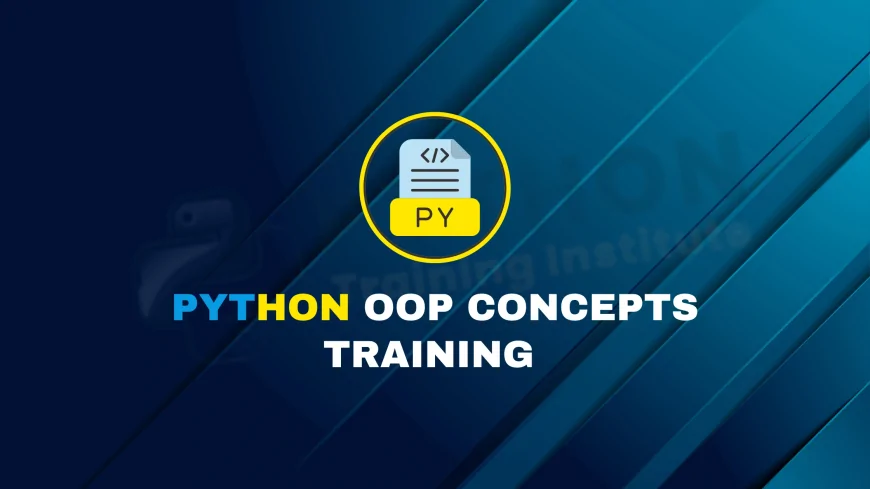Python OOP (Object-Oriented Programming) Concepts Training Pune | Pune’s Best Python Class for Object-Oriented Programming
Discover the top Python OOP (Object-Oriented Programming) training classes in Pune. Learn from expert-led institutes like Webasha Technologies, Ethans Tech, and Codekul with hands-on projects, flexible schedules, and certification support.

Table of Contents
- Introduction
- Why Learn Python OOP?
- Core OOP Concepts Overview
- Pune's OOP Training Landscape
- Top Institutes Offering OOP Training in Pune
- How to Choose the Right OOP Course
- Common FAQs
- Conclusion
Introduction
As Python continues to dominate industries like web development, data science, AI, and automation, mastering Object-Oriented Programming (OOP) is essential. Whether you're a beginner or working professional in Pune, understanding OOP concepts such as classes, inheritance, and encapsulation is key to writing clean, scalable code. This comprehensive guide explores top OOP training options in Pune, teaching formats, real-world projects, and how to choose the right course.
Why Learn Python OOP?
- Modular & Scalable Code: OOP encourages writing reusable code through classes and objects.
- Industry Standard: OOP underpins frameworks like Django, Flask, and essential design patterns.
- Maintainability: Concepts like encapsulation and abstraction enhance readability and debug-ability.
- Interview Readiness: Employers in Pune expect demonstrable OOP proficiency in resumes and technical rounds. According to LotusITHub and TechnoGeeks, in-depth OOP modules are core to training curricula :contentReference[oaicite:1]{index=1}.
Core OOP Concepts Overview
- Classes & Objects: Blueprint vs instance, constructors (__init__), instance vs static vs class methods.
- Inheritance & Polymorphism: Single, multiple, multi-level inheritance; method overloading/overriding.
- Encapsulation: Public, protected, private access control; property getters/setters.
- Abstraction: Using abstract base classes and interfaces to define clean APIs.
- Magic Methods & Operator Overload: __str__, __repr__, __eq__, __getitem__, etc.
- Design Patterns: Singleton, Factory, Observer, Strategy—bridging theory and implementation.
- Exception Handling: OOP-aware error handling with custom exceptions, try-except-else-finally constructs :contentReference[oaicite:2]{index=2}.
Pune's OOP Training Landscape
Pune hosts a range of training centers—both classroom and online—offering focused Python OOP courses. Some of the prominent ones include:
Mode: Online & classroom; 4-month certification course (₹15,999)
Features: In-depth OOP modules—classes, constructors, exceptions—alongside multithreading, Django, and data science tools .
Key Takeaways
- Learning Formats: Nearly every provider offers both classroom and online options, with flexible schedules including weekends.
- OOP Depth: Core OOP constructs (classes, inheritance, polymorphism, encapsulation) are foundational; advanced topics like exceptions, multithreading, and design patterns are offered in mid-to-high-end courses.
- Hands-On Projects: Most institutes integrate OOP into real-world projects—such as Flask APIs, Django apps, or automation systems.
-
Placement Support: A majority include resume prep, mock interviews, and placement networks.
-
Certifications: FITA focuses on Python Institute certifications (PCEP/PCAP/PCPP), while others offer their own recognized course certificates.
Top Institutes Offering OOP Training in Pune
WebAsha Technologies –
Format & Delivery
-
Offers both classroom sessions in Pune (Mathura Nagar) and live online batches, with flexible weekday/evening options .
-
Typical course duration: 30–45 days for core Python, with advanced topics like OOP covered in 1–2 months .
OOP & Advanced Python Topics
-
OOP Essentials: Classes, objects, methods, constructors (
__init__), attributes, and access modifiers (public, private, protected) . -
Inheritance & Polymorphism: Single and multi-level inheritance, method overriding, operator overloading .
-
Encapsulation & Abstraction: Property decorators, encapsulated data, usage of
@property, and abstract base classes. -
Advanced Topics: Exception handling with custom exceptions, file I/O, multithreading, module creation, and more .
Real-Time Application & Projects
-
Students apply OOP concepts in capstone-level projects such as inventory/class management systems, class-based APIs, and automation scripts .
-
Training includes the use of Python libraries like NumPy, Pandas, and frameworks such as Django and Flask to solidify OOP principles .
Trainers & Mentorship
-
Trainers bring 8–12+ years of experience in Python development, working on real-time projects in companies like IBM, Airtel, and Vodafone .
-
Personalized attention with small batch sizes ensures live debugging and feedback sessions .
Learning Flexibility
-
Options to reschedule missed classes, access to recorded sessions, and 24×7 doubt resolution support .
Certification & Career Support
- Participants earn a globally recognized Python Programming certificate, including OOP proficiency
-
Active placement assistance with resume preparation, mock interviews, and connections to hiring partners—over 1,500 students placed last year
How to Choose the Right OOP Course in Pune
Curriculum Depth & Relevance
-
Ensure the course covers core OOP concepts—classes & objects, inheritance, polymorphism, encapsulation, abstraction—as well as magic methods, design patterns, and error handling.
-
Prefer programs that integrate practical application, such as using OOP in REST APIs (Flask/Django), GUI apps, or automation scripts.
Hands-On Projects
-
Real-world projects are essential. Look for courses offering group or individual assignments, mini-projects, or capstones with OOP—such as class-based inventory systems or web API development.
-
Choose training that emphasizes practical skill-building, rather than just theoretical lectures.
Instructor Quality & Batch Size
-
Pay attention to industry-experienced trainers. Small batch sizes facilitate better interaction and debugging support.
-
Institutes like CodingBytes and Ethans Tech emphasize live mentorship and code-level feedback.
Certifications & Placement Support
-
Opt for centers offering credible certifications—such as Python Institute credentials (PCEP, PCAP) or recognized internal certifications.
-
Determine if placement assistance is included: resume preparation, mock interviews, and job referrals are key differentiators.
Mode of Delivery & Flexibility
-
Choose based on your schedule: weekend vs weekday classes, live-remote vs in-person.
-
Check flexibility: session recording availability, make-up classes, and lab access are crucial for working professionals.
Tools, Libraries, and Ecosystem
-
Strong OOP courses include tools like Git, virtual environments, SQLAlchemy, Docker, and Python libraries used in real-world development.
-
Bonus if they introduce frameworks integrating OOP design—like Flask, Django, or REST APIs.
Cost, Duration & EMI Options
-
Fees vary widely: ₹10k for core OOP training up to ₹70k for full-stack or certification programs.
-
Look for EMI plans, discounts, or placement guarantees where possible.
Quick Comparison Chart
| Criteria | High-Value Target |
|---|---|
| Curriculum | OOP + design patterns + real-world application |
| Projects | Capstone/demo projects using OOP (CLI/Web apps) |
| Instructor Support | Small batches, experienced trainers |
| Certification | Python Institute or institute-recognized certificates |
| Placement Support | Resume prep, mock interviews, hiring partnerships |
| Flexibility | Weekend/evening batches with recorded sessions |
| Tools | Git, Docker, SQLAlchemy, Flask/Django |
| Fees | ₹10k–₹70k with EMI/placements available |
Decision Flow
-
Define your goal: core OOP, web development, or full-stack?
-
Review course outlines: ensure in-depth OOP plus hands-on use cases.
-
Check trainer & batch structure: look at faculty experience and class size.
-
Talk to students: ask for project portfolios, placement stats, and alumni feedback.
-
Verify flexibility: is online participation/rescheduling available?
-
Compare pricing & value: measure ROI based on support, tools, and outcomes.
FAQs
1. What is OOP and why is it important?
OOP stands for Object-Oriented Programming. It enables modular, reusable, extendable code—crucial for building large-scale Python apps like web services and automation scripts.
2. Do I need programming knowledge before taking an OOP course?
Yes—basic Python syntax, data structures, and functions are required to understand OOP concepts effectively.
3. Which OOP concepts are covered in Pune courses?
Key topics include classes, objects, constructors, inheritance, polymorphism, encapsulation, abstraction, magic methods, and design patterns.
4. What types of projects do OOP courses include?
Expect capstone applications like class-based inventory management systems, Flask REST APIs with OOP structure, and simulation projects with OO design.
5. Which certification exams are relevant?
PCEP, PCAP, and PCPP levels (Python Institute) are often taught at FITA Academy and recognized globally.
6. How long are typical OOP training programs?
Ranges from 30–80 hours depending on course depth, usually delivered over 4–8 weeks via weekends or evenings.
7. Are these weekend batches available?
Yes—all highlighted institutes—AiAdventures, Lotus, Technogeeks—offer weekend-friendly options.
8. Do I get job placement help?
Yes—most include resume-building, mock interviews, and hiring connections. Lotus IT Hub and AiAdventures offer strong placement records.
9. Can I attend online?
All providers support online classes, with live intakes or pre-recorded content.
10. Will I learn design patterns?
Yes—FITA Academy and advanced courses at Technogeeks include patterns like Singleton and Factory.
11. How is exception handling taught?
Courses include structured use of try-except-else-finally blocks and custom exception classes for robust design.
12. Is access to class recordings provided?
Yes—most institutes share recordings in case you miss sessions or need revisions.
13. Are projects collaborative?
Some include peer code reviews and group development to simulate real-world workflows.
14. Do I need to pay extra for course materials?
No—training includes notes, code samples, project briefs, and sometimes lifetime access to LMS.
15. Can I switch from basics to advanced OOP?
Many institutes offer bridging modules or advanced follow-up classes (e.g., AiAdventures’ Advanced OOP).
16. Will I be mentored during the course?
Yes—every institute provides mentor support, doubt-solving sessions, and individual guidance.
17. How to assess course quality?
Check reviews on sources like Lotus, Technogeeks, and UrbanPro. Look for success stories and code portfolios.
18. What tools are used in teaching?
Courses cover Python IDEs (PyCharm, VS Code), Git, virtual environments, and testing frameworks (pytest).
19. Is mobile install necessary?
Optional—you can code on PC. But some institutes share mobile-friendly resources or apps for practice.
20. What's my next step after OOP?
You can specialize in web development (Django), data science, machine learning, or backend services with OOP architectures.
Conclusion
Mastering Python OOP in Pune is more than learning syntax—it's about applying design patterns, building modular code and delivering real-world projects. Pune offers many training paths—from career-assisted OOP bootcamps to certification-backed deep-dives. Choose based on your career plan, learning format, and project exposure. Based on your goals, each of the highlighted institutes can equip you with strong OOP foundations and pathways to developer roles.
What's Your Reaction?
 Like
0
Like
0
 Dislike
0
Dislike
0
 Love
0
Love
0
 Funny
0
Funny
0
 Angry
0
Angry
0
 Sad
0
Sad
0
 Wow
0
Wow
0
















